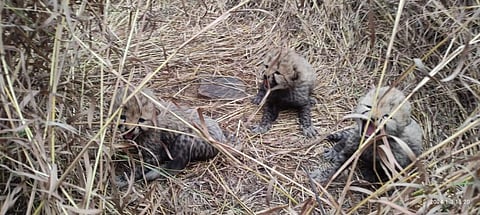

After a series of deaths that marred the cheetah introduction project in India, the officials at Kuno National Park (KNP), Madhya Pradesh announced the birth of three cubs on January 3, 2024. This is the second litter born at KNP.
Union environment minister Bhupender Yadav announced the birth of the cubs in a post on X (formerly Twitter). It read:
Thrilled to share that Kuno National Park has welcomed three new members. The cubs have been born to Namibian cheetah, Aasha.
The cubs born will add to the four others that were born on Indian soil in 2023.
The first litter was born to three-year-old Siyaya, rechristened as Jwala, in March 2023, who was also brought from Namibia. Only one of the female cubs survived, the other three died due to dehydration and weakness. Jwala was never released in the wild.
Till now, there were 15 cheetahs at KNP — seven males and females each and a cub. With the inclusion of the cubs, the tally now stands at 18.
Uttam Sharma, chief conservator of forests (CCF) at KNP, stated, “The cubs are about 6-8 days old and are likely to have been born around December 26. They are all healthy and are being monitored by veterinarians.”
It would take around six months to know the genders of the cubs, the CCF said. “The details of the cubs’ parentage will be explained later,” Sharma added.
According to the book The End of a trail: The cheetah in India, cheetahs reach the reproductive age between 20 and 24 months and the gestation period lasts between 90 and 100 days.
It is likely that the cubs were bred in captivity when they were inside the enclosure since July and August following the deaths of adult cheetahs due to septicaemia.
Meanwhile, an expert on condition of anonymity said the surviving cub from last year is still in captivity and has been hand reared. “I am not sure what we are celebrating. This is captive breeding. The idea in bringing cheetahs from Africa was to establish a free-ranging population and we aren't taking any steps to achieve that,” the expert said.
As per an annual report released in 2023, Asha was captured for quarantine on July 20, 2023. She has spent a total of 131 days in free-ranging conditions.
The forest department, in the last leg of December 2023, released Agni, Vayu, Veera and Pavan into the park. However, Agni was soon tranquillised and brought back after it ventured far into the boundaries of Rajasthan.
“Congrats to the officials on the ground overseeing Project Cheetah in India. This is a positive development, but a long and challenging road lies ahead for these cubs. Losses should be anticipated on their journey to becoming ecologically functional. We wish the cheetahs and project staff all the best,” Vincent van der Merwe, South African expert involved with the initial stages of the project, told Down To Earth.